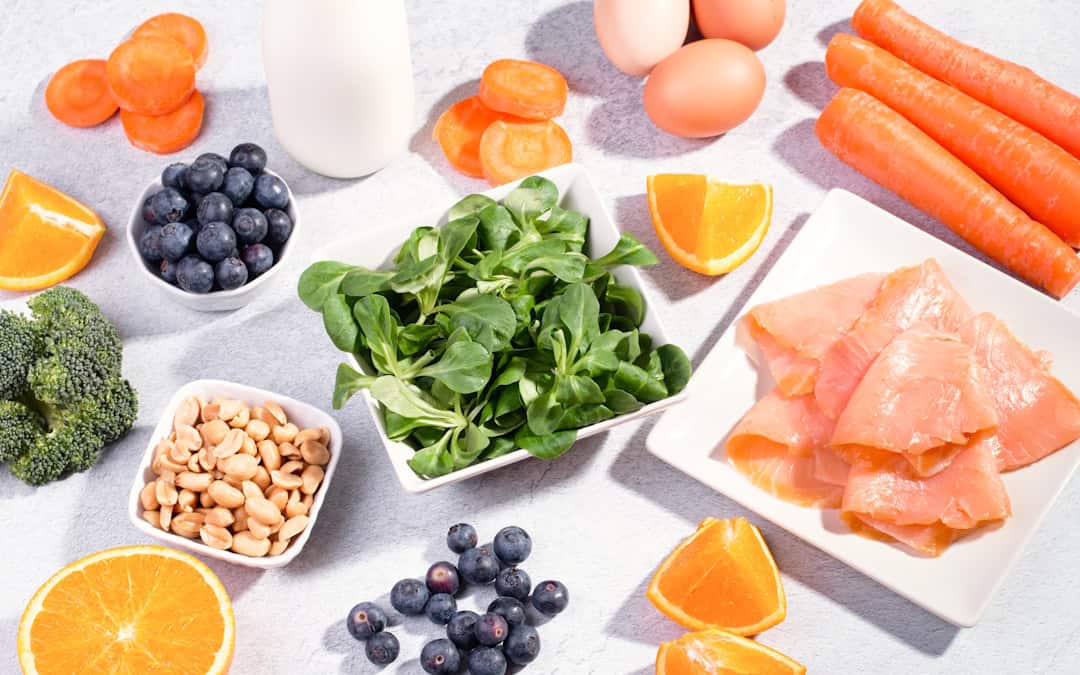The numbers are shocking – approximately 250 million people worldwide deal with vision loss, including 12 million people aged 40 and over in the United States. Furthermore, according to the Centers for Disease Control and Prevention (CDC), almost 7% of children under 18 in the US have a diagnosed vision condition. Cataracts and age-related macular degeneration (AMD) top the list of causes.
There is good news: You can protect your eyesight naturally by eating the right foods.
Research shows that certain nutrients can make a big difference to your eye health. A mix of vitamins C and E, zinc, and powerful antioxidants like lutein and zeaxanthin help reduce your risk of serious eye problems. These nutrients, which you can get from everyday foods, have been proven to lower the risk of cataracts and slow down age-related vision issues.
In this article we’ll discuss the foods that best nourish and protect your eyes. You’ll learn what to eat, how to add these foods to your meals, and the proven benefits of each nutrient.
Keeping your eyes healthy is important now and for years to come. Whether you’re concerned about your current vision or want to protect your eyes for the future, this article gives you practical and delicious ways to keep your eyes healthy through what you eat.
Everyday Foods That Protect Your Vision
The food you load on your plate is the key to maintaining healthy vision. The right foods for eye health can naturally boost your eye protection. Let’s look at the best foods that protect your vision.
Colorful fruits and vegetables for eye health
Bright fruits and vegetables shield your eyes with powerful antioxidants. Dark leafy greens like kale and spinach pack lutein and zeaxanthin—antioxidants that protect your macula, the part of the eye which handles central, detailed vision. These nutrients work like natural sunglasses to filter harmful blue light.
Yellow and orange produce should be an important part of your diet. Sweet potatoes give you more than 200% of your daily recommended vitamin A. Carrots, apricots, and mangoes serve as great sources too. Red bell peppers offer a double boost with vitamin C and vitamin E.
Your plate should look like a rainbow to maximize protection. Brussels sprouts, broccoli, and corn help fight age-related vision problems with eye-healthy nutrients.
Omega-rich fish and nuts for retinal support
Your retina’s composition includes approximately 50-60% DHA, an omega-3 fatty acid found mostly in fish. This nutrient supports your retina’s function and maintains photoreceptor membranes.
Fish that are rich in omega-3 include salmon, tuna, sardines, and mackerel. Health and medical research organizations suggest that eating two servings of oily fish weekly can lower your risk of developing eye diseases that can threaten your vision.
Walnuts, flaxseeds, and chia seeds work well if you don’t enjoy fish. Weekly nut consumption can potentially lower your risk of early AMD by 35%, and plant-based omega-3s have been shown to help maintain healthy tear film and reduce eye inflammation.
Hydrating foods that prevent dry eyes
Dry eyes affect over 50% of adults, and if you are one of them then these specific foods can boost eye moisture. Cucumbers, watermelon, oranges, and strawberries help with hydration and support tear production.
Omega fatty acids stabilize your tear film’s oil layer to prevent dry eyes. Omega-rich foods include:
- Fish (mackerel, salmon, trout)
- Nuts and seeds (especially walnuts)
- Plant oils (flaxseed, sunflower)
And don’t forget to drink water each day! Water intake throughout the day also helps ensure that your eyes stay properly moisturized.
Improving your diet helps, but regular professional eye exams remain vital to protect your vision. Schedule a comprehensive evaluation with Chang Eye Group to safeguard your eyesight for years ahead.
Building Your Eye-Healthy Meal Plan
Now that you know some of the best foods to include in your diet, let’s look at some options to include them in your meal plan. These suggestions should help you create a daily menu full of foods for eye health that deliver the essential nutrients your eyes need.
Breakfast ideas for morning eye health protection
Vision-boosting breakfasts give your eyes a great start. Greek yogurt with berries and granola gives you antioxidants that shield your macula. You might prefer a savory kale and spinach omelet that’s rich in lutein and zeaxanthin – these powerful carotenoids make your retina stronger. Fruit toast paired with milk and an orange works well too, as vitamin C helps prevent macular degeneration.
Lunch combinations that boost vision health
Your midday meals are perfect times to feed your eyes. A tuna sandwich on low-GI bread loaded with cucumber and spinach combines omega-3s with vital vitamins. Corn and veggie fritters make a tasty lunch that’s packed with carotenoids. Another option is a wellness or nourish bowl topped with poached eggs and halloumi – this is a great choice to delivers multiple vision-protective nutrients in one dish.
Dinner recipes rich in eye nutrients
Your evening meals should focus on retinal health. A serving of grilled fish with sweet potatoes and steamed broccoli gives you the perfect mix of omega-3s plus vitamins A and C. Quinoa tabbouleh with eggs provides lutein and beneficial proteins. Even simple stir-fries using tofu, hokkien noodles, and colorful vegetables help improve your consumption of nutrients that promote your eye health.
Smart snacks for between-meal vision protection
Snacks can also help keep your eyes healthy between meals. A handful of mixed nuts provides daily vitamin E and omega-3s. Make smoothies that promote eye nutrition by blending milk, yogurt, banana, spinach, and berries. And don’t forget a snack tray with fresh vegetables including carrots and celery gives you easy access to beta-carotene.
Good nutrition can help to maintain your vision naturally. Our team of eye doctors in Pittsburgh at Chang Eye Group can give you a detailed examination and help with your dietary improvements if you have any concerns about your eye health and vision.
Seasonal Eating for Year-Round Eye Protection
Seasonal eating provides the best foods for eye health throughout the year. Grocery stores and markets throughout the Pittsburgh area will stock many season-specific fruits and vegetables, each bringing unique nutrients that naturally protect your vision as the weather changes.
Spring and summer vision boosters
Your eyes can feast on nature’s vision protectors at the time farmers’ markets overflow with colorful produce in warmer months. Research shows that summer fruits and vegetables rich in antioxidants can reduce the risk of cataracts and AMD.
Colorful summer standouts like strawberries and citrus fruits pack vitamin C that stops free radicals from damaging your eyes. Green peppers and tomatoes add to this vitamin C powerhouse group, and broccoli gives you lutein and zeaxanthin.
Warmer months bring leafy greens to peak freshness. Romaine lettuce, kale, and spinach have lutein and zeaxanthin that protect your retina’s macula—the area responsible for central vision. These nutrients also help shield your eyes from sun damage, which becomes especially important during the bright days of summer months.
Fall and winter eye-healthy options
Nature provides different nutrients for eye health as temperatures get colder. Autumn brings pumpkins and sweet potatoes loaded with vitamin A—essential for night vision and overall eye function. You can get more than your daily vitamin A requirement by consuming just one cup of sweet potatoes.
Brussels sprouts, a winter vegetable, contain valuable carotenoids that are also known to boost vision health. And holiday-favorite cranberries provide vitamins A and C, which work together to protect against cataracts and macular degeneration.
Winter meals often feature turkey, which contains zinc—a mineral in your retina that supports vital enzyme functions for eye health. People’s retinas with macular degeneration typically show low zinc levels.
Salmon and other cold-water fish remain excellent sources year-round for the omega-3 nutrients. These can help with dry eye symptoms that can often get worse in winter due to heated indoor spaces.
How Your Diet Fights Common Eye Problems
Your dietary choices can help curb common eye disorders that threaten your vision. Learning about the link between foods for eye health and preventing eye diseases gives you the knowledge to help protect your vision.
Foods that help prevent cataracts
Cataracts cloud your eyesight and affect more than one in six Americans over 40. The good news is that antioxidant-rich foods can substantially slow their development. Studies show that foods high in vitamins C and E may prevent cataracts and slow their growth.
Your daily meals should include citrus fruits, tomatoes, red peppers, kiwi, broccoli, and strawberries to get sufficient vitamin C. Sunflower oil, almonds, and green vegetables like spinach provide vitamin E. Two servings of nuts give you 8-14 milligrams of vitamin E daily.
Lutein and zeaxanthin need special focus. These carotenoids are found in eggs and leafy greens and can also help protect your eyes from cataracts. Research shows that 10 mg of carotenoids in your diet cuts cataract risk by 26%.
Nutrients that protect against macular degeneration
Age-related macular degeneration (AMD) puts your central vision at risk, but proper nutrition can help defend its progression. The AREDS2 study proved that lutein, zeaxanthin, vitamins C and E, zinc, and selenium work together to protect against AMD.
Zinc also plays a vital role—it moves vitamin A from your liver to your retina to produce melanin.
Eating cold-water fish twice weekly provides omega-3s that lower AMD risk. Macular degeneration research by the BrightFocus Foundation also found that people who followed the Mediterranean diet saw a 25% drop in progression from early to late macular degeneration.
Dietary choices for reducing dry eye symptoms
Nutrition can help improve dry eye syndrome. Omega-3 fatty acids from fish including salmon, sardines, and mackerel create the oily part of your tears, which prevents them from drying too quickly. Recent studies from 2023 show that omega-3 supplements substantially reduced dry eye symptoms.
Hydrating foods and probiotics can help boost tear production. There is also some research that suggests evening primrose oil, which contains gamma-linolenic acid, may ease dry eye symptoms through its anti-inflammatory properties.
Complete Vision Protection includes Proper Nutrition and Expert Care at Chang Eye Group
Natural diet choices serve as a powerful defense to protect your vision from common eye diseases. Studies show that consuming foods with omega-3s, lutein, and essential vitamins can substantially lower your risk of cataracts and macular degeneration.
The food you eat makes a difference to your long-term vision. Every meal gives you a chance to support your eye health through delicious choices of colorful vegetables, omega-rich fish, or seasonal produce. And even small changes like adding nuts to your breakfast or eating more leafy greens can benefit your eyes long-term.
A balanced diet is a vital part of eye health, but professional care remains essential. Chang Eye Group can help you create an individual-specific eye health plan and provide a comprehensive eye examination. Regular check-ups combined with proper nutrition will protect your precious vision for years ahead. Schedule an appointment today with one of our expert eye doctors in Pittsburgh by calling us at (412) 429-2020.





